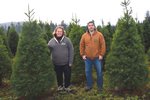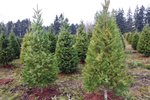

For those unfamiliar with the history of Rainier, the name Sprouffske may not mean anything, but the people who live in the small community know that the Sprouffske family history is intertwined with the roots of the city.
Four generations of the Sprouffske family, which has been a presence in Rainier for 101 years, have worked on the Sprouffske Trees, Inc. tree farm since its inception in 1966.
“The tree farm was started by my grandparents, who lived on the farm right over there,” Darren Sprouffske said as he pointed over hundreds of Douglas firs toward a little house near the entrance of the 200-acre farm. “That was in ‘66. That included my grandparents and their four kids.”
As time progressed, each new generation has taken up the mantle of Sprouffske Trees, including the third generation, which Sprouffske is part of.
“I sheared trees out here when I was a kid, and planted and fertilized and all that stuff, but now I have a more active role in the management side of it,” Sprouffske said. “My grandfather was born on the farm. My dad grew up on the farm. I grew up on the farm. My kids are now growing up on the farm. No matter where life takes us — this is home for us.”
All Sprouffskes who work on the farm live there, too. Sprouffske and his wife, Alisa, along with their children Ian and Jared, live on the farm, in addition to the family of Jonathan and Shelley Sprouffske, which includes kids Thomas, John Paul and Alexander. Members of the second generation of tree farmers also live there.
Shelley Sprouffske married third-generation member Jonathan Sprouffske.
“I was a transplant,” Shelley Sprouffske said. “I was not a dirt-girl growing up. I love it because it’s just a great sense of family and community. With Jonathan, his parents both passed by the time he was 22, and it was really important for him that I embrace the farm lifestyle.”
She said she’s proud to bear the Sprouffske name and to raise her boys in the tree-farming tradition, giving them an understanding of how to live out the virtues of hard work and responsibility.
“The boys are growing up in the house my husband grew up in,” Shelley Sprouffske said. “And so there’s a lot of history there. There’s a lot of pride in that they get to carry on their father’s legacy, and their grandparents’, even though they’ve never met them.”
Sprouffske Trees’ season spans from Thanksgiving weekend to the second weekend after the holiday.
The farm is usually open every day during its season, but members of the second generation of Sprouffske tree farmers contracted COVID-19 just as the season was about to get going. Since the third generation all have other jobs, the fourth generation had to step in to help run the farm on the weekends.
“We’re really grateful to be able to continue in business as a family, generational farm,” Shelley Sprouffske said. “With everything that happened this Christmas, the fourth generation just stepped right in.”
Darren Sprouffske said the COVID-19 diagnosis of the second Sprouffske generation this year took its toll on the family.
“It was really stressful, because you are worried about them,” he said. “COVID is a serious thing, and we had two of them that ended up being in the hospital, so you’re worried about them while you’re still trying to do your weekend work on the farm.”
But as Shelley Sprouffske said, the fourth generation kids, ages 8 to 17, made the farm function this year.
“Watching our kids step in was inspiring,” she said. “We had some work parties outside, socially distanced, where everybody was decorating wreaths and doing all the things we needed to do in the second generation’s absence.”
In spite of the family’s health challenges, Darren Sprouffske said the fourth generation kids showed true resilience in the face of the very real threat that COVID-19 made against the family.
“As a parent, you walk that line of not wanting the kids to panic, while letting them know that this is serious,” he said. “I thought they did really well with that. They’re trying to juggle school, sports, and on the weekends, working on the farm here. I thought they handled that pretty well and stepped up.”
There’s another reason why the Sprouffskes had to limit days of operation this year, which involves the basic lessons of economics.
“There has been, in the last five to 10 years, a tree shortage across the nation,” Shelley Sprouffske said. “That has affected us as well. Last year alone in Washington state, nearly 25% of the growers didn’t renew their licenses, and so there’s less supply. And there’s continuing growth in demand for the trees. For us, we were dealing with difficulty in getting seedlings and being able to keep certain species in the ground.”
Darren Sprouffske added to that, saying that with other farms shutting down due to the selling of farm land or lack of inventory, Sprouffske Trees had enjoyed three consecutive years of record-setting sales, though that success was curtailed this year due to the farm’s limited season.
Tree farmers have to contend with droughts, he said, as well as other phenomena in the economy that affect the growth of trees, like accessibility to productive seedlings.
“When you are growing trees, you can’t just order something and restock a shelf,” he said. “You’ve got to wait for things to kind of just grow.”
Part of limiting the season had to do with inventory this year.
“Business has been so strong, that we’ve been trying to slow it down a little bit, shortening the season to make sure we still have trees for the next 10 to 15 to 20 years, because our plan is to keep the tree farm going forward,” Shelley Sprouffske said.
The Sprouffskes grow three main types of trees: noble firs, Douglas firs and grand firs.
Each of the trees have features that make them popular to customers, she said.
Noble firs have spaces between the branches so ornament-enthusiasts have the perfect canvas to make their decorating-hearts happy, while grand firs only have needles on the sides of their branches, which make them look feathery and attractive. As for the Douglas firs, they are hearty trees whose branches don’t snap back when someone’s pet tries to climb on one of them.
The Sprouffskes said the most popular tree they sell would have to be the noble, but the one they have the most inventory of is the Douglas.
Despite all the challenges they have faced in the realms of health and economy, one thing has remained the same for the Sprouffskes.
“We stayed open when other farms shut down because we have such a loyal customer base,” Darren Sprouffske said. “There’s one family that comes down from Spanaway. They’ve been coming here for 45 years now. There’s a lot of families that, for whatever reason, it’s important for them to come out here.”
Indeed, the Sprouffskes know what their farm means to their customers, Shelley Sprouffske said.
“Christmas starts at our farm, and (tree cutting) is one of the first things people do to kick off their season,” she said. “There’s an added responsibility that we deliver a good experience, because there’s a lot of things that we haven’t been able to control in the last couple of years, and people being able to still come out and walk through the outside and breathe in the fresh air — to be able to give that to them is something we’re really grateful for.”